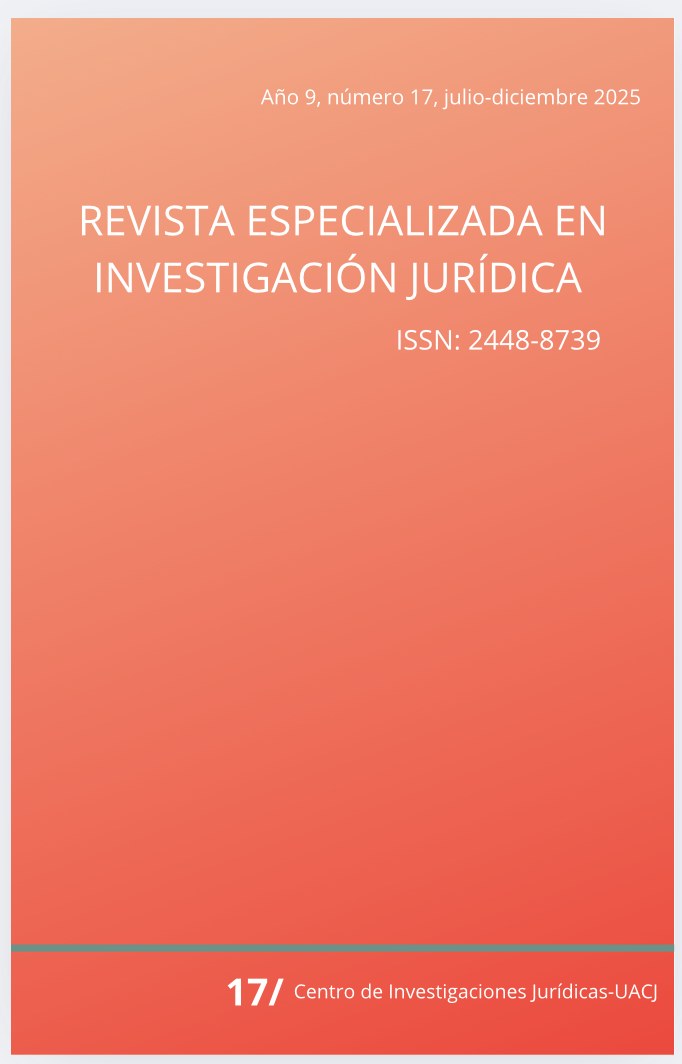Legal personality: a historical conceptual-theoretical construction to protect fundamental rights
DOI:
https://doi.org/10.20983/reij.2025.2.4Keywords:
associations, fundamental rights, legal personality, separation of patrimoniesAbstract
The construction of the concept legal personality has derived into a superlative importance for legal science as it represents a legal protection of fundamental rights for individuals, which must support all legal criteria regarding the separation of assets and the corresponding responsibility. Therefore, based upon deductive and historical methods, by using techniques upon analysis of documentation and texts, proof the origin since ancient times in Rome, getting stronger in Middle Ages and in the current century, becoming an essential element for the protection of fundamental rights for persons. Contemporary law has created new actors in commerce such as interest groups (stakeholders), beneficiary controllers, and compliance officers among others, who must respect legal personality as a fundamental pillar of human rights protection. Patrimony’s separation between a shareholder and a company has been achieved precisely upon the recognition of legal personality for both persons and therefore the responsibility that each entity must assume. When this is not respected, the legal personality is disrupted and human rights are likely to be affected. The conclusion reached is that this ancient theoretical construction in effect in contemporary law is a sine qua non element for the protection of fundamental rights for an enterprise,
Downloads
References
Álvarez Ledesma, M. I. (2023). Derechos humanos. Una visión multidimensional. McGraw-Hill.
Anzures Gurría, J. J. (2014). La protección constitucional de las asociaciones. Sobre la dimensión colectiva del derecho de asociación. Centro de Estudios Políticos y Constitucionales.
Bachmann Fuentes, R. I. y Navarro Caro, V. (2022). Derechos de la naturaleza y personalidad jurídica de los ecosistemas: Nuevo paradigma de protección medioambiental. Un enfoque comparado. Revista Internacional de Pensamiento Político, 16, 357-378. https://doi.org/10.46661/revintpensampolit.6336
Bardel, D. (2020). Una aproximación al contenido de la responsabilidad social desde la perspectiva jurídica. Derecho Global. Estudios sobre Derecho y Justicia, 6(16), 159-199. https://doi.org/10.32870/dgedj.v6i16.326
Ceballos Rosero, F. A. (2020). Teoría heterogénea del concepto de persona en derecho. Estudios de Derecho, 78(171), 14-35. https://doi.org/10.17533/udea.esde.v78n171a01
Cubillos Garzón, C. E. (2023). La persona jurídica. De Savigny a la jurisprudencia. Revista E-Mercatoria, 22(1), 93-113. https://doi.org/10.18601/16923960.v22n1.04
De Castro y Bravo, F. (2008). Derecho Civil de España (Vol. ii). Editorial Civitas.
Escobar Roca, G. (2005). Introducción a la teoría jurídica de los derechos humanos. Trama Editorial.
Fernández, J. L. y Bajo, A. (2012). La Teoría del Stakeholder o de los Grupos de Interés, pieza clave de la rse, del éxito empresarial y de la sostenibilidad. Revista Internacional de Investigación en Comunicación aDResearch esic, 6(6), 130-143. https://doi.org/10.7263/ADR.RSC.006.07
Fernández Sessarego, C. (2001). ¿Qué es ser “persona” para el Derecho? Derecho pucp, 54, 289-333. https://doi.org/10.18800/derechopucp.200101.011
Ferrara, F. (2022). Teoría de las Personas Jurídicas. Olejnik. https://books.google.com.mx/books?id=jrTtEAAAQBAJ&printsec=frontcover&hl=es#v=onepage&q&f=false
García Amado, J. A. (2014). Responsabilidad jurídica. Eunomía. Revista En Cultura de la Legalidad, 1, 125-132. https://e-revistas.uc3m.es/index.php/EUNOM/article/view/2163
Hung, F. (2009). Una aproximación crítica al estatuto jurídico del concebido no nacido. Ius, 3(23). https://doi.org/10.35487/rius.v3i23.2009.191
Iglesias, J. (1979). Derecho Romano. Instituciones de derecho privado. Editorial Ariel.
Ledesma Uribe, J. (2017). La defensa de los derechos humanos en Roma. El defensor de la ciudad en Derecho Romano. Revista de la Facultad de Derecho de México, 62(258), 355-369. https://doi.org/10.22201/fder.24488933e.2012.258.60735
Mantilla Molina, R. L. (2002). Derecho mercantil (29.a ed.). Porrúa.
Novelli, C., Bongiovanni, G. y Sartor, G. (2021). Un marco conceptual para la personalidad jurídica y su aplicación a la ia. Jurisprudencia, 13(2), 194-219. https://doi.org/10.1080/20403313.2021.2010936
Serick, R. (2020). Apariencia y realidad de las sociedades mercantiles. El abuso de derecho por medio de la personalidad jurídica. Trad. Brutau, J. Olejnik.
Zagrebelsky, G. (1995). El derecho dúctil. Trotta.
Tesis: (I Región) 8o., 2. (10.a). (2017). Suprema Corte de Justicia de la Nación. “Personas morales o jurídicas. Son titulares de los derechos previstos en la Convención Americana sobre Derechos Humanos, en la medida en que resulten conformes con su naturaleza y fines”. https://sjf2.scjn.gob.mx/detalle/tesis/2014183
Downloads
Published
Issue
Section
License
Copyright (c) 2025 Juana del Carmen Ramos Juárez

This work is licensed under a Creative Commons Attribution-NonCommercial-ShareAlike 4.0 International License.
El titular de los derechos de explotación de los contenidos de la Revista Especializada en Investigación Jurídica es el Autor o Autora
El licenciamiento bajo el cual se publican los contenidos es Atribución-NoComercial-CompartirIgual 4.0 Internacional (CC BY-NC-SA 4.0) por lo que se autoriza compartir, copiar y redistribuir el material en cualquier medio y formato, adaptar, remezclar, transformar y construir a partir del material para cualquier propósito, siempre y cuando no sea con fines comerciales y se cite al autor(es) original y a la fuente, proporcione la liga a la licencia Creative Commons e indique claramente si se hicieron cambios a la obra y especifique cuales fueron dichos cambios. Para más información consultar el apartado de Política de Acceso Abierto de la revista.

















